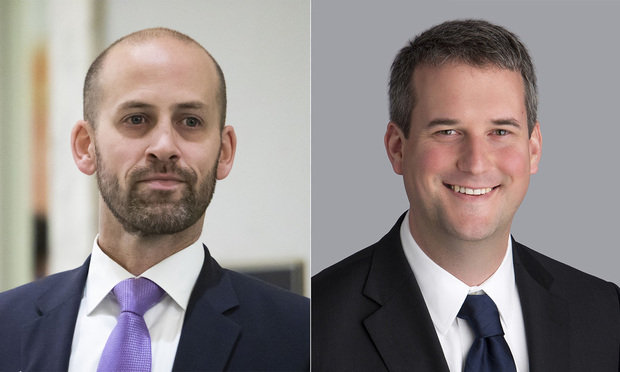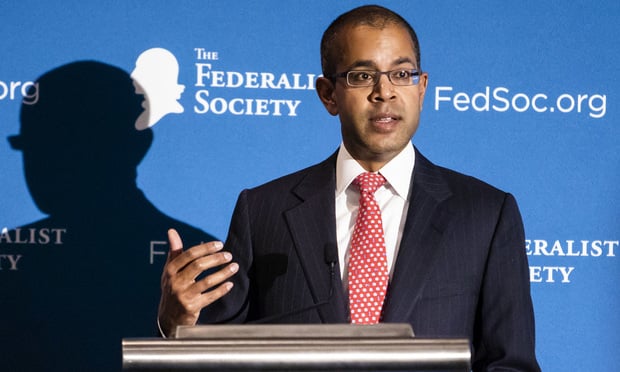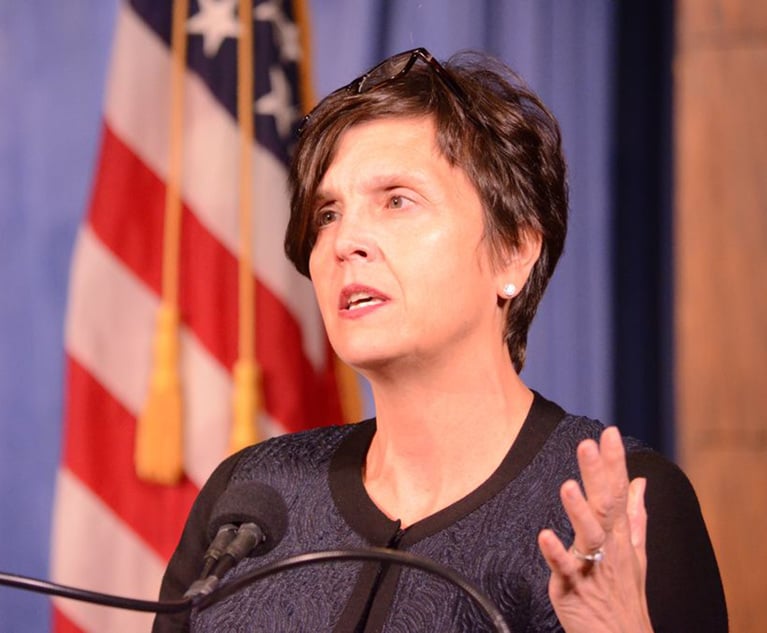Current and Former Texas Solicitors General Line Up Against CFPB
Both said a restriction on the president's ability to remove a bureau director violates the Constitution's separation of powers.
July 29, 2019 at 07:15 PM
4 minute read
 (L to R) Scott Keller, the former Texas solicitor general now at Baker Botts, and Texas' current solicitor general, Kyle Hawkins. (Photos: Diego Radzinschi/ALM and courtesy photo)
(L to R) Scott Keller, the former Texas solicitor general now at Baker Botts, and Texas' current solicitor general, Kyle Hawkins. (Photos: Diego Radzinschi/ALM and courtesy photo)
Texas' current and former solicitors general are calling on the U.S. Supreme Court to take up a case that could cripple the Consumer Financial Protection Bureau.
Texas' current solicitor general, Kyle Hawkins, is among a group of conservative state officials, including colleagues from Arkansas, Kansas and Georgia, who have signed an amicus brief Monday against the CFPB. Hawkins is also joined by Scott Keller, the former Texas solicitor general now at Baker Botts, who signed a similar brief on behalf of the Cato Institute.
Both briefs, filed in the case Seila Law LLC v. Consumer Financial Protection Bureau, said the current structure of the CFPB is unconstitutional since it's headed by a single director who can only be removed by the president for cause. That restriction on the president's discretion to remove a bureau director violates the Constitution's separation of powers.
“So the CFPB wields substantial power exercised by the fiat of a single, almost unreviewable, virtually unremovable director,” Keller wrote for Cato. “The CFPB director can issue regulations that bind any person under its jurisdiction, investigate potential violations of those regulations, prosecute actions in its own administrative tribunals, and appropriate Federal Reserve money to itself.
If the president cannot remove an agency head at will, it could create a situation where the director could ignore orders from the executive branch.
“The threat to liberty posed by the CFPB is uniquely acute. In a supposed effort to protect consumers, the Dodd-Frank Act deliberately stripped power that had been spread across 'seven different federal regulators' as well as their state-law counterparts,” the brief signed by Hawkins said. “Rather than shift that power to an existing department overseen by a cabinet secretary, however, the act concentrated that power in the hands of a bureaucrat who need not seek the approval either of the electorate or an elected official.”
The case is the latest to reach the Supreme Court challenging the constitutionality of the consumer bureau's structure, an issue long pressed by business advocates and Republicans on Capitol Hill. The justices have not yet taken any case that squarely addresses the CFPB's structure.
Seila Law, represented by Kannon Shanmugam of Paul, Weiss, Rifkind, Wharton & Garrison, is challenging a ruling from the U.S. Court of Appeals for the Ninth Circuit. Shanmugam filed a petition in the high court in June, arguing the president should have the power to remove the CFPB director at will.
 Kannon Shanmugam, partner with Williams & Connolly, speaking during a panel discussion titled “The Future of the Past: Stare Decisis,” at The Federalist Society's 2018 National Lawyers Convention, held at The Mayflower Hotel in Washington, D.C., on Thursday, November 15, 2018. Photo: Diego M. Radzinschi/ALM
Kannon Shanmugam, partner with Williams & Connolly, speaking during a panel discussion titled “The Future of the Past: Stare Decisis,” at The Federalist Society's 2018 National Lawyers Convention, held at The Mayflower Hotel in Washington, D.C., on Thursday, November 15, 2018. Photo: Diego M. Radzinschi/ALM “The time for this court to resolve the long-running debate about the constitutionality of the CFPB is now,” Shanmugam wrote. “The court has consistently recognized that the Constitution empowers the president to keep federal officers accountable by removing them from office.”
The Trump-era Justice Department has taken litigation positions against the single-director structure of the consumer bureau, and the government is expected to participate in the case at the Supreme Court.
In December, the Justice Department pitched the Supreme Court on taking up the issue, but only in a case that would not force Justice Brett Kavanaugh to recuse. Kavanaugh, as a D.C. Circuit judge, had assailed the “massive, unchecked power” of the CFPB.
The Justice Department's response in the Seila Law case was due Monday, but Noel Francisco, the U.S. solicitor general, received an extension to file by Aug. 28.
Read more:
Justice Dept. Frets About Kavanaugh Recusal in Challenge to CFPB's Power
Ninth Circuit Upholds CFPB Structure in Ordering Law Firm to Comply With Investigation
Ex-CFPB Lawyer 'May Have Abused' Authority, Inspector General Says
Consumer Bureau Lawyer Rebuked Over Racial Remarks Is Leaving Agency
CFPB Sues NY Law Firm, Alleging Practice Had No “Meaningful Attorney Involvement'
This content has been archived. It is available through our partners, LexisNexis® and Bloomberg Law.
To view this content, please continue to their sites.
Not a Lexis Subscriber?
Subscribe Now
Not a Bloomberg Law Subscriber?
Subscribe Now
NOT FOR REPRINT
© 2025 ALM Global, LLC, All Rights Reserved. Request academic re-use from www.copyright.com. All other uses, submit a request to [email protected]. For more information visit Asset & Logo Licensing.
You Might Like
View All
Skadden and Steptoe, Defending Amex GBT, Blasts Biden DOJ's Antitrust Lawsuit Over Merger Proposal
4 minute read
'Lack of Independence' or 'Tethered to the Law'? Witnesses Speak on Bondi
4 minute read
Trending Stories
- 1Paul Hastings, Recruiting From Davis Polk, Continues Finance Practice Build
- 2Chancery: Common Stock Worthless in 'Jacobson v. Akademos' and Transaction Was Entirely Fair
- 3'We Neither Like Nor Dislike the Fifth Circuit'
- 4Local Boutique Expands Significantly, Hiring Litigator Who Won $63M Verdict Against City of Miami Commissioner
- 5Senior Associates' Billing Rates See The Biggest Jump
Who Got The Work
J. Brugh Lower of Gibbons has entered an appearance for industrial equipment supplier Devco Corporation in a pending trademark infringement lawsuit. The suit, accusing the defendant of selling knock-off Graco products, was filed Dec. 18 in New Jersey District Court by Rivkin Radler on behalf of Graco Inc. and Graco Minnesota. The case, assigned to U.S. District Judge Zahid N. Quraishi, is 3:24-cv-11294, Graco Inc. et al v. Devco Corporation.
Who Got The Work
Rebecca Maller-Stein and Kent A. Yalowitz of Arnold & Porter Kaye Scholer have entered their appearances for Hanaco Venture Capital and its executives, Lior Prosor and David Frankel, in a pending securities lawsuit. The action, filed on Dec. 24 in New York Southern District Court by Zell, Aron & Co. on behalf of Goldeneye Advisors, accuses the defendants of negligently and fraudulently managing the plaintiff's $1 million investment. The case, assigned to U.S. District Judge Vernon S. Broderick, is 1:24-cv-09918, Goldeneye Advisors, LLC v. Hanaco Venture Capital, Ltd. et al.
Who Got The Work
Attorneys from A&O Shearman has stepped in as defense counsel for Toronto-Dominion Bank and other defendants in a pending securities class action. The suit, filed Dec. 11 in New York Southern District Court by Bleichmar Fonti & Auld, accuses the defendants of concealing the bank's 'pervasive' deficiencies in regards to its compliance with the Bank Secrecy Act and the quality of its anti-money laundering controls. The case, assigned to U.S. District Judge Arun Subramanian, is 1:24-cv-09445, Gonzalez v. The Toronto-Dominion Bank et al.
Who Got The Work
Crown Castle International, a Pennsylvania company providing shared communications infrastructure, has turned to Luke D. Wolf of Gordon Rees Scully Mansukhani to fend off a pending breach-of-contract lawsuit. The court action, filed Nov. 25 in Michigan Eastern District Court by Hooper Hathaway PC on behalf of The Town Residences LLC, accuses Crown Castle of failing to transfer approximately $30,000 in utility payments from T-Mobile in breach of a roof-top lease and assignment agreement. The case, assigned to U.S. District Judge Susan K. Declercq, is 2:24-cv-13131, The Town Residences LLC v. T-Mobile US, Inc. et al.
Who Got The Work
Wilfred P. Coronato and Daniel M. Schwartz of McCarter & English have stepped in as defense counsel to Electrolux Home Products Inc. in a pending product liability lawsuit. The court action, filed Nov. 26 in New York Eastern District Court by Poulos Lopiccolo PC and Nagel Rice LLP on behalf of David Stern, alleges that the defendant's refrigerators’ drawers and shelving repeatedly break and fall apart within months after purchase. The case, assigned to U.S. District Judge Joan M. Azrack, is 2:24-cv-08204, Stern v. Electrolux Home Products, Inc.
Featured Firms
Law Offices of Gary Martin Hays & Associates, P.C.
(470) 294-1674
Law Offices of Mark E. Salomone
(857) 444-6468
Smith & Hassler
(713) 739-1250











